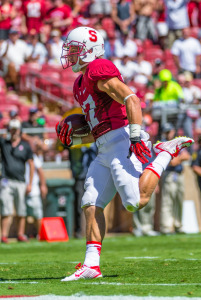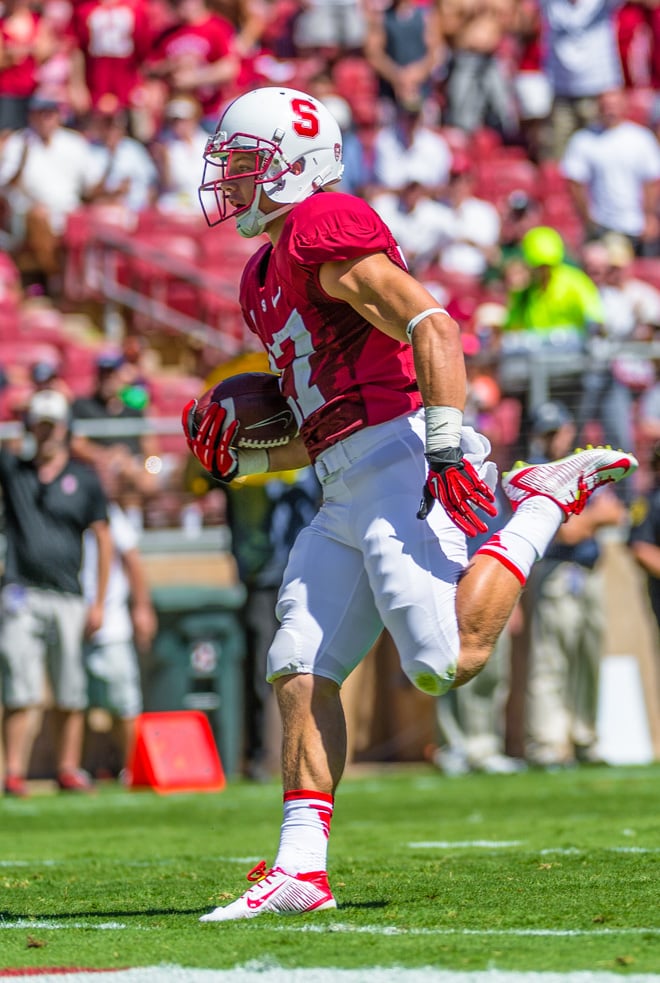Halfway through the regular season, Stanford’s most efficient offensive player hasn’t been star receiver Ty Montgomery, fellow senior wideout Devon Cajuste or everyone’s favorite NFL progeny, junior running back Barry J. Sanders.
Instead, it’s been true freshman Christian McCaffrey, who’s averaged 8.4 yards per carry and 19.8 yards per catch in a limited hybrid role. When used over the last six games, McCaffrey’s speed has kept opposing defenses off balance, prompting calls to “Free McCaffrey” on a 2014 Cardinal offense that’s had trouble producing consistently.

McCaffrey’s offense at Valor Christian High — which produced quite a remarkable highlight tape for the running back — used some similar principles to Stanford’s system, but also tended to spread out its athletes a lot more than the Cardinal offenses of years past. This season, though, Stanford’s scheme has begun to shift toward what McCaffrey is already familiar with.
“All the offensive coaches do a great job of when they see something and they think that it’s going to work, then they run it,” he said after practice this week. “This year we have a different team than I think Stanford’s seen in the past. I think we’re a lot more athletic. So I think some of the different formations that I’m being put in, a lot of the other guys are being put in too, contribute directly to that.”
“Anytime you can get your athletes in space it’s a good thing,” McCaffrey added.
The son of former Stanford and NFL great Ed ’90 M.A. ’91, McCaffrey has shown up in the slot, in the I-formation and everywhere in between. But he said he’s not trying to model himself after speedy senior Kelsey Young, who was used in a similar hybrid role two years ago. McCaffrey isn’t trying to copy any particular running back, for that matter.
“No aspect of my game is perfect,” McCaffrey said. “I’m just working on every aspect of my game and really trying to perfect it, whether it’s agility drills, speed drills, recognizing blitzes. Everything that could make me the best back I can be.”
As for the suggestion that the dynamic McCaffrey should be used more? Head coach David Shaw isn’t in any rush.
“Just like we did with Ty, we build them slow,” Shaw said. “We don’t try to put everything on them right away. He’ll gradually get a little bit more every week until he’s really ready to do it all.”
***
Stanford’s ability to pressure Washington State quarterback Connor Halliday hamstrung the Cougars’ threatening passing attack, but the Cardinal will have to back off somewhat on Saturday against an Arizona State offense that is much more well-rounded.
“This is a little different, because we’re playing against a team that will run the ball,” Shaw said. “It’s not just a pass rush every play. We have to account for the runs on any given down.”
Stanford’s front seven has been scrutinizing the Sun Devils’ offensive line in hopes of being able to identify when passes are coming.
“We always want to get after those guys every time,” said sophomore outside linebacker Peter Kalambayi, who leads Stanford with 4.5 sacks and 5.5 tackles for loss. “We’ve just been studying those tackles a lot, looking at those guards, seeing the way they like to move and things like that. But it’s a more balanced attack, definitely.”
The biggest question mark for the Sun Devils is the extent to which fifth-year senior Taylor Kelly will play at quarterback, returning from a foot injury that has vaulted redshirt sophomore Mike Bercovici into the starting role. Shaw emphasized earlier this week that the Cardinal weren’t worrying about which quarterback started for the Sun Devils, though he admitted on Wednesday that Stanford’s scout team quarterbacks have been breaking contain in practice to prepare for the mobile Kelly.
***
Shaw confirmed on Wednesday that his injured players — junior receiver Michael Rector, sophomore tight end Austin Hooper and senior linebacker James Vaughters — were progressing as the coaching staff expected. He also noted that Montgomery “has done well,” though it wasn’t clear whether he was referring to the offseason injury to the receiver’s shoulder or another issue that has developed this season.
“It’s midseason,” Shaw said. “We’ve got a lot of bumps and bruises.”
Contact Joseph Beyda at jbeyda ‘at’ stanford.edu.
